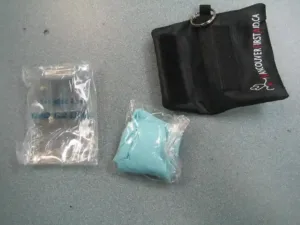The lowest rates and highest quality CPR and AED training in Hamilton, Ontario are offered by Hamilton First Aid. This well-known St Mark James company has become the leading training service provider for first aid and cardiopulmonary resuscitation training courses for more than 5 years within the Hamilton community. Low prices, wide selection of classes, competent and easily-approachable trainers, and well-maintained training locations has made this business the premier service provider for CPR and AED training in Hamilton, Ontario. Participants can enrol in a variety of courses including comprehensive, two-day first aid, CPR and AED programs such as standard first aid. On-line and food handling training is also available. To register for a CPR and AED course in Hamilton, Ontario use the contact information below or click the button to be directed to the registration page.
Start you Registration – Enrol in CPR and AED in Hamilton Here
To register on-line for a CPR and AED Course in Hamilton, Ontario Click Here
Enroll at first aid, CPR, and AED training courses through Hamilton First Aid to acquire the best St Mark James programs at the cheapest rates. To learn more or to register for a certification or renewal course go to the Hamilton First Aid by clicking here.
You can also enroll via e-mail or walk-in at one of Hamilton First Aid’s training centers. Hamilton First Aid’s staff is also available over the telephone during business hours for any inquiries you may have.
- Email this provider using: [email protected]
- Visit the website by going to: www.firstaidcprhamilton.ca
What can Hamilton First Aid offer its trainees?
Basic First Aid
Basic first aid training with Hamilton First Aid covers numerous emergency situations which require immediate interventions. Situations requiring basic first aid include fever, animal bites, broken bones, sprains, burns, swallowing of foreign objects, and many more will be included in the training course. Should the trainee have queries regarding special cases such as basic first aid for ingestion of dangerous chemicals or allergies, Hamilton First Aid’s trainers are highly qualified to answer.
Latest Basic Life Support Guidelines

Basic Life Support (BLS) deals with actions immediately undertaken following sudden cardiac arrest. CPR and AED use are part of the BLS pathway created by the American Heart Association in 2010 and update during the subsequent years. In order to become competitive health care providers with up-to-date skills, knowledge of the latest BLS pathway is a must. “Look, Listen, Feel” has been removed from the BLS algorithm and the sequence of actions has been updated to Circulation – Airway – Breathing. Immediate CPR must be started following recognition of sudden cardiac arrest, after which AED use is determined. CPR is continued until return of spontaneous circulation. Hamilton First Aid’s training course will focus on providing effective chest compressions and minimizing interruptions to ensure adequate blood flow to and from the heart during CPR training.
Certification and Refresher Courses
Trainees who have successfully finished their enrolled training course will receive a three-year St Mark James license for first aid, CPR, and AED. Moreover, trainees who have certifications close to expiration may also renew their certifications through refresher courses offered by Hamilton First Aid.
Lowest rates for the highest quality education
The rates offered by Hamilton First Aid for training courses are the lowest in Hamilton for the quality training given. Regardless of the training course you enrolled on, Hamilton First Aid has the most competitive rates.
Wide range of classes available
You will find a substantial range of classes from which to choose. Classes are readily available throughout the week and at varying times. Special classes are also offered to those who prefer a particular schedule or cannot enroll in the regular classes, or who will be training as a group of people, such as company training.
Best facilities and equipment
Hamilton First Aid’s training facilities have high-end equipment and clean and spacious training and classrooms, all easily accessible to prospective trainees.
Start Your Training Now!
Did You Know?

After your first set of teeth have fallen out (milk teeth, baby teeth), what replaces it is permanent teeth. Once you lose a permanent tooth, nothing will grow back in its place and people often get veneers or dentures. If you knock out a permanent tooth, be sure to get emergency dental care, especially if the tooth left its root in your gums. Not getting the entire tooth extracted can cause serious infection, as well as pain. The dentist will make sure all remnants of the tooth are removed, and if you choose to, give you a tooth implant.
Learn more about tooth implants and injuries in a training program.
